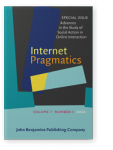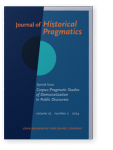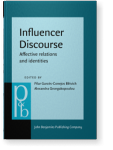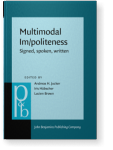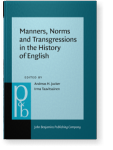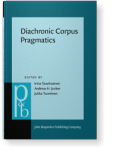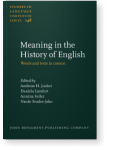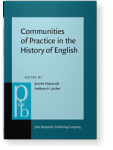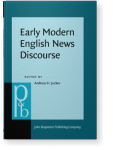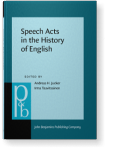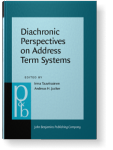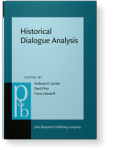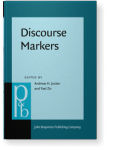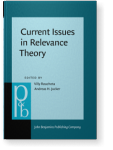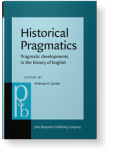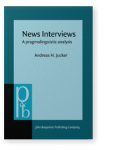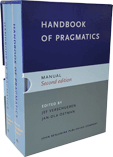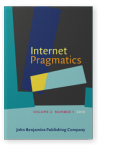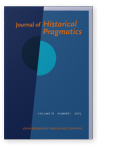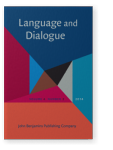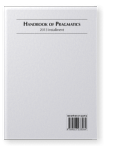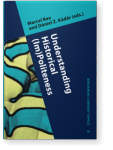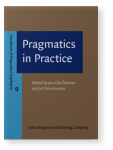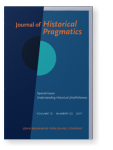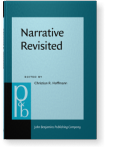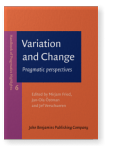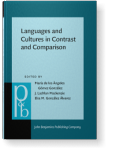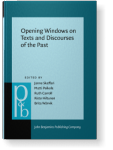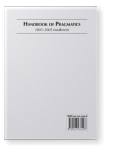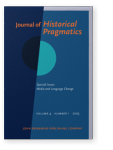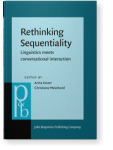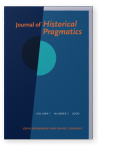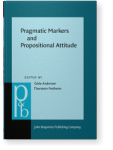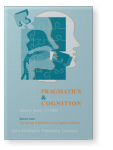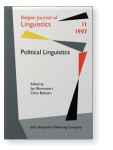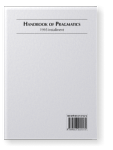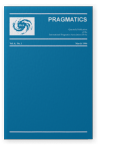Andreas H. Jucker
List of John Benjamins publications for which Andreas H. Jucker plays a role.
Journals
Book series
Multimodal Im/politeness: Signed, spoken, written
Edited by Andreas H. Jucker, Iris Hübscher and Lucien Brown
[Pragmatics & Beyond New Series, 333] 2023. vii, 360 pp.
Subjects Communication Studies | Discourse studies | Gesture Studies | Pragmatics | Theoretical linguistics
Manners, Norms and Transgressions in the History of English: Literary and linguistic approaches
Edited by Andreas H. Jucker and Irma Taavitsainen
[Pragmatics & Beyond New Series, 312] 2020. viii, 298 pp.
Subjects Discourse studies | English linguistics | English literature & literary studies | Historical linguistics | Pragmatics
Diachronic Corpus Pragmatics
Edited by Irma Taavitsainen, Andreas H. Jucker and Jukka Tuominen
[Pragmatics & Beyond New Series, 243] 2014. viii, 335 pp.
Subjects Corpus linguistics | Historical linguistics | Pragmatics | Theoretical linguistics
Meaning in the History of English: Words and texts in context
Edited by Andreas H. Jucker, Daniela Landert, Annina Seiler and Nicole Studer-Joho
[Studies in Language Companion Series, 148] 2013. vii, 348 pp.
Subjects English linguistics | Historical linguistics | Theoretical linguistics
Communities of Practice in the History of English
Edited by Joanna Kopaczyk and Andreas H. Jucker
[Pragmatics & Beyond New Series, 235] 2013. vii, 291 pp.
Subjects English linguistics | Historical linguistics | Pragmatics | Sociolinguistics and Dialectology
Early Modern English News Discourse: Newspapers, pamphlets and scientific news discourse
Edited by Andreas H. Jucker
[Pragmatics & Beyond New Series, 187] 2009. vii, 227 pp.
Subjects Discourse studies | English linguistics | Germanic linguistics | Historical linguistics | Pragmatics
Speech Acts in the History of English
Edited by Andreas H. Jucker and Irma Taavitsainen
[Pragmatics & Beyond New Series, 176] 2008. viii, 318 pp.
Subjects Discourse studies | English linguistics | Germanic linguistics | Historical linguistics | Pragmatics
Diachronic Perspectives on Address Term Systems
Edited by Irma Taavitsainen and Andreas H. Jucker
[Pragmatics & Beyond New Series, 107] 2003. vii, 441 pp.
Subjects Discourse studies | Historical linguistics | Pragmatics
Historical Dialogue Analysis
Edited by Andreas H. Jucker, Gerd Fritz and Franz Lebsanft
[Pragmatics & Beyond New Series, 66] 1999. viii, 478 pp.
Subjects Discourse studies | Germanic linguistics | Historical linguistics | Pragmatics | Romance linguistics
Discourse Markers: Descriptions and theory
Edited by Andreas H. Jucker and Yael Ziv
[Pragmatics & Beyond New Series, 57] 1998. x, 363 pp.
Subjects Discourse studies | Pragmatics
Current Issues in Relevance Theory
Edited by Villy Rouchota and Andreas H. Jucker
[Pragmatics & Beyond New Series, 58] 1998. xii, 368 pp.
Subjects Pragmatics | Semantics | Sociolinguistics and Dialectology
Historical Pragmatics: Pragmatic developments in the history of English
Edited by Andreas H. Jucker
[Pragmatics & Beyond New Series, 35] 1995. xvi, 623 pp.
Subjects English linguistics | Germanic linguistics | Historical linguistics | Pragmatics
News Interviews: A pragmalinguistic analysis
Andreas H. Jucker
[Pragmatics & Beyond, VII:4] 1986. ix, 195 pp.
Subjects Pragmatics
2023 Chapter 1. Multimodal im/politeness: Introduction Multimodal Im/politeness: Signed, spoken, written, Jucker, Andreas H., Iris Hübscher and Lucien Brown (eds.), pp. 1–23 | Chapter
2023 Chapter 12. “He offered an apologetic smile”: The politeness of apologetic gestures Multimodal Im/politeness: Signed, spoken, written, Jucker, Andreas H., Iris Hübscher and Lucien Brown (eds.), pp. 327–351 | Chapter
This contribution focuses on the multimodal aspects of apologies. In terms of politeness and face management, apologies are ambivalent. They are redressive and indicate a concern for the hearer, but they also include a certain amount of self-blame and thus threaten the speaker’s own positive… read more
2022 Corpus pragmatics Handbook of Pragmatics: Manual, Verschueren, Jef and Jan-Ola Östman (eds.), pp. 1516–1527 | Chapter
2022 Historical pragmatics Handbook of Pragmatics: Manual, Verschueren, Jef and Jan-Ola Östman (eds.), pp. 744–755 | Chapter
2020 The discourse of manners and politeness in Restoration and eighteenth-century drama Manners, Norms and Transgressions in the History of English: Literary and linguistic approaches, Jucker, Andreas H. and Irma Taavitsainen (eds.), pp. 101–120 | Chapter
The eighteenth century is often referred to as the age of politeness, and the term politeness has been argued to be a key term in a variety of settings at this time. This paper sets out to investigate the discourse of politeness and, more generally, the discourse of manners during this period and… read more
2020 Manners, norms and transgressions: Introduction Manners, Norms and Transgressions in the History of English: Literary and linguistic approaches, Jucker, Andreas H. and Irma Taavitsainen (eds.), pp. 1–23 | Chapter
In this volume we focus on different types of manners, norms and their transgressions. One kind of transgression can be called “blunders” and deals with violations of accepted behaviour, conduct or manners. A second kind draws more attention to language use in interpersonal communication with… read more
2019 Internet pragmatics and the fuzziness of analytical categories: A response to Francisco Yus Internet Pragmatics 2:1, pp. 41–45 | Commentary
2015 Twenty years of historical pragmatics: Origins, developments and changing thought styles Journal of Historical Pragmatics 16:1, pp. 1–24 | Article
This paper provides an outline of the changes in linguistics that gave rise to historical pragmatics in the 1990s and that have shaped its development over the twenty years of its existence. These changes have affected virtually all aspects of linguistic analyses: the nature of the data, the… read more
2014 Diachronic corpus pragmatics: Intersections and interactions Diachronic Corpus Pragmatics, Taavitsainen, Irma, Andreas H. Jucker and Jukka Tuominen (eds.), pp. 3–26 | Article
2014 Complimenting in the history of American English: A metacommunicative expression analysis Diachronic Corpus Pragmatics, Taavitsainen, Irma, Andreas H. Jucker and Jukka Tuominen (eds.), pp. 257–276 | Article
Speech acts are functional entities and can, therefore, not be searched for directly in large computerised corpora. They can only be located on the basis of specific patterns that are known to be typical for a particular speech act, e.g. with IFIDs like “(I’m) sorry”. In this contribution we… read more
2014 “Maybe, but probably not”: Negotiating likelihood and perspective Language and Dialogue 4:2, pp. 284–298 | Article
The goal of our paper is to explore one of the functions of everyday expressions of likelihood; more specifically, to propose that they play an important role in negotiating not only likelihood but also perspective. We will examine examples of such expressions in the context of conversational… read more
2013 Corpus pragmatics Handbook of Pragmatics: 2013 Installment, Östman, Jan-Ola and Jef Verschueren (eds.), pp. 1–18 | Article
2013 Communities of practice as a locus of language change Communities of Practice in the History of English, Kopaczyk, Joanna and Andreas H. Jucker (eds.), pp. 1–16 | Article
2013 Uncovering layers of meaning in the history of the English language Meaning in the History of English: Words and texts in context, Jucker, Andreas H., Daniela Landert, Annina Seiler and Nicole Studer-Joho (eds.), pp. 1–16 | Article
2012 Positive and negative face as descriptive categories in the history of English Understanding Historical (Im)Politeness: Relational linguistic practice over time and across cultures, Bax, Marcel and Dániel Z. Kádár (eds.), pp. 175–194 | Article
Studies in the history of politeness in English have generally relied on the notions of positive and negative face. While earlier work argued that a general trend from positive politeness to negative politeness can be observed, more recent work has shown that in Old English and in Middle English… read more
2011 Mass media Pragmatics in Practice, Östman, Jan-Ola and Jef Verschueren (eds.), pp. 248–263 | Article
2011 Positive and negative face as descriptive categories in the history of English Understanding Historical (Im)Politeness, Bax, Marcel and Dániel Z. Kádár (eds.), pp. 178–197 | Article
Studies in the history of politeness in English have generally relied on the notions of positive and negative face. While earlier work argued that a general trend from positive politeness to negative politeness can be observed, more recent work has shown that in Old English and in Middle English… read more
2010 “Audacious, brilliant!! What a strike!”: Live text commentaries on the Internet as real-time narratives Narrative Revisited: Telling a story in the age of new media, Hoffmann, Christian R. (ed.), pp. 57–78 | Article
Live text commentaries, published on the Internet, are written narratives that give a minute-by-minute account of a sports event while it is actually unfolding. Alternative terms that have been suggested for them are “event tracker”, “live ticker”, “minute-by-minute report”, or “matchcast”. They… read more
2010 Historical pragmatics Variation and Change: Pragmatic perspectives, Fried, Mirjam, Jan-Ola Östman and Jef Verschueren (eds.), pp. 110–122 | Article
2009 Newspapers, pamphlets and scientific news discourse in Early Modern Britain Early Modern English News Discourse: Newspapers, pamphlets and scientific news discourse, Jucker, Andreas H. (ed.), pp. 1–9 | Article
2008 Politeness in the history of English English Historical Linguistics 2006: Selected papers from the fourteenth International Conference on English Historical Linguistics (ICEHL 14), Bergamo, 21–25 August 2006, Dury, Richard, Maurizio Gotti and Marina Dossena (eds.), pp. 3–29 | Article
Politeness in English has often been seen as a development from a positive politeness culture to a negative politeness culture. Several case studies provide evidence for such a development. A first case study offers an analysis of the use of pronominal terms of address in Chaucer’s Canterbury Tales… read more
2008 Communicative tasks across languages: Movie narratives in English, in English as a foreign language and in German Languages and Cultures in Contrast and Comparison, Gómez González, María de los Ángeles, J. Lachlan Mackenzie and Elsa M. González Álvarez (eds.), pp. 247–274 | Article
In cooperation between the California State University, Long Beach and the Justus Liebig University, Giessen narratives were elicited from different groups of speakers (native speakers of English and native speakers of German who contributed either narratives in English or in their native language). read more
2008 Apologies in the history of English: Routinized and lexicalized expressions of responsibility and regret Speech Acts in the History of English, Jucker, Andreas H. and Irma Taavitsainen (eds.), pp. 229–244 | Article
2008 Fishing for compliments: Precision and recall in corpus-linguistic compliment research Speech Acts in the History of English, Jucker, Andreas H. and Irma Taavitsainen (eds.), pp. 273–294 | Article
2008 Speech acts now and then: Towards a pragmatic history of English Speech Acts in the History of English, Jucker, Andreas H. and Irma Taavitsainen (eds.), pp. 1–23 | Article
2008 "Methinks you seem more beautiful than ever": Compliments and gender in the history of English Speech Acts in the History of English, Jucker, Andreas H. and Irma Taavitsainen (eds.), pp. 195–228 | Article
2006 Historical pragmatics Handbook of Pragmatics: 2006 Installment, Verschueren, Jef and Jan-Ola Östman (eds.), pp. 1–14 | Article
2005 News discourse: Mass media communication from the seventeenth to the twenty-first century Opening Windows on Texts and Discourses of the Past, Skaffari, Janne, Matti Peikola, Ruth Carroll, Risto Hiltunen and Brita Wårvik (eds.), pp. 7–21 | Article
Against the methodological background of historical discourse analysis, this paper traces some of the relevant factors that influenced the development of news discourse from the seventeenth to the twenty first century. In the seventeenth century the occasional news publications that were published… read more
2005 Mass media Handbook of Pragmatics: 2003–2005 Installment, Östman, Jan-Ola and Jef Verschueren (eds.), pp. 1–14 | Article
2003 Mass media communication at the beginning of the twenty-first century: Dimensions of change Media and Language Change, Herring, Susan C. (ed.), pp. 129–148 | Article
This paper identifies and analyses current dimensions of change in mass media communication and in particular changes in mass media news transmitted via the Internet. In comparison with traditional media such as newspapers, Internet mass media products rely increasingly on a hypertext structure… read more
2003 1. Diachronic perspectives on address term systems: Introduction Diachronic Perspectives on Address Term Systems, Taavitsainen, Irma and Andreas H. Jucker (eds.), pp. 1–25 | Article
2002 Discourse markers as turns: Evidence for the role of intersubjectivityin interactional sequences Rethinking Sequentiality: Linguistics meets conversational interaction, Fetzer, Anita and Christiane Meierkord (eds.), pp. 151–178 | Article
2000 Editorial Journal of Historical Pragmatics 1:1, pp. v–vi | Miscellaneous
2000 Diachronic speech act analysis: Insults from flyting to flaming Journal of Historical Pragmatics 1:1, pp. 67–95 | Article
In this paper we want to develop a model for the diachronic analysis of speech acts by tracing one particular speech act through the history of English, viz. insults. Speech acts are fuzzy concepts which show both diachronic and synchronic variation. We therefore propose a notion of a… read more
2000 Actually and other markers of an apparent discrepancy between propositional attitudes of conversational partners Pragmatic Markers and Propositional Attitude, Andersen, Gisle and Thorstein Fretheim (eds.), pp. 207 ff. | Article
1999 Historical Dialogue Analysis: Roots and Traditions in the Study of the Romance Languages, German and English Historical Dialogue Analysis, Jucker, Andreas H., Gerd Fritz and Franz Lebsanft (eds.), pp. 1 ff. | Article
1998 And people just you know like ‘wow’: Discourse Markers as Negotiating Strategies Discourse Markers: Descriptions and theory, Jucker, Andreas H. and Yael Ziv (eds.), pp. 171 ff. | Article
1998 Discourse Markers: Introduction Discourse Markers: Descriptions and theory, Jucker, Andreas H. and Yael Ziv (eds.), pp. 1 ff. | Article
1998 Introduction Current Issues in Relevance Theory, Rouchota, Villy and Andreas H. Jucker (eds.), pp. 1 ff. | Article
1998 Interactive aspects of reference assignment in conversations The Concept of Reference in the Cognitive Sciences, Kronfeld, Amichai and Lawrence D. Roberts (eds.), pp. 153–187 | Article
We propose a model of reference that contrasts with standard linguistic approaches in that it focuses on the role of interaction in reference, arguing that referring expressions in conversations are not designed for interchangeable audiences but rather exploit the common ground between partners.… read more
1997 Persuasion by Inference: Analysis of a party political broadcast Political Linguistics, Blommaert, Jan † and Chris Bulcaen (eds.), pp. 121–137 | Article
1996 Mass media Handbook of Pragmatics: 1995 Installment, Verschueren, Jef, Jan-Ola Östman, Jan Blommaert † and Chris Bulcaen (eds.), pp. 1–14 | Article
1996 Explicit and implicit ways of enhancing common ground in conversations Pragmatics 6:1, pp. 1–18 | Article
1995 The historical Perspective in Pragmatics Historical Pragmatics: Pragmatic developments in the history of English, Jucker, Andreas H. (ed.), pp. 3 ff. | Article
